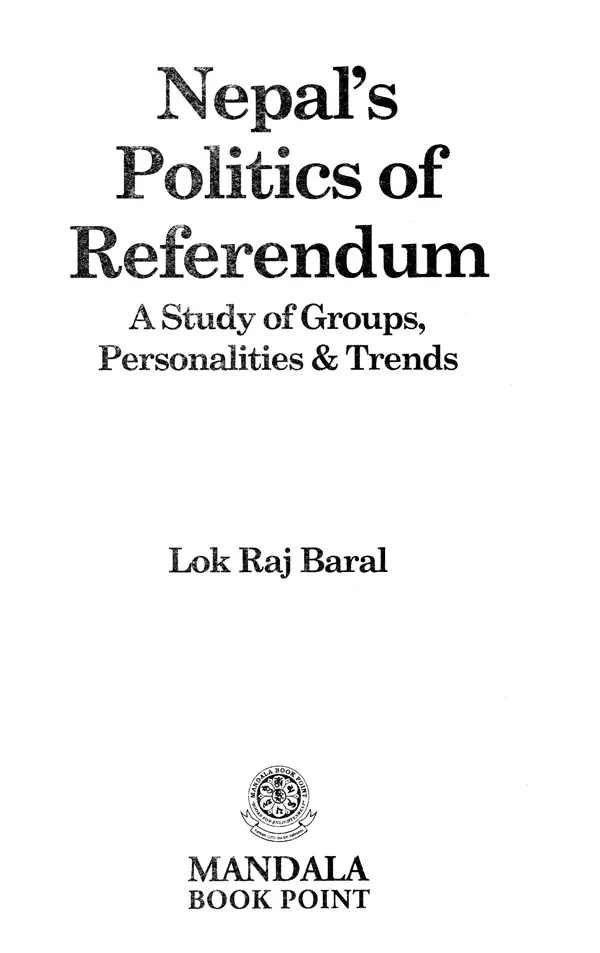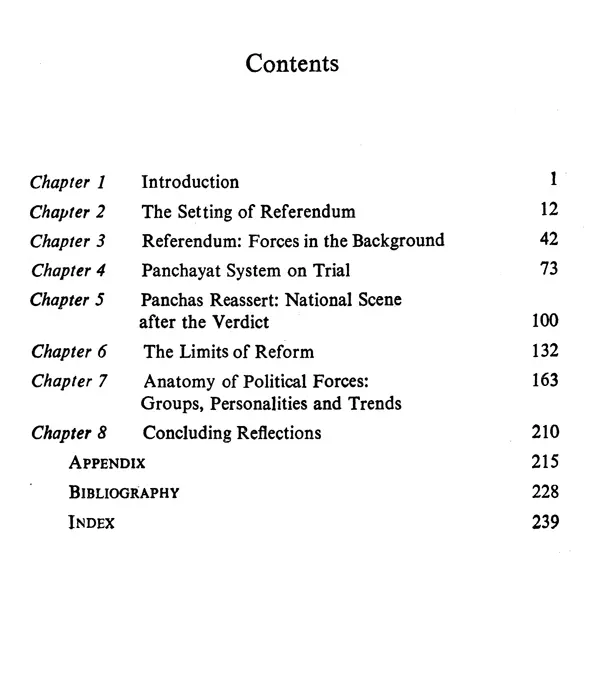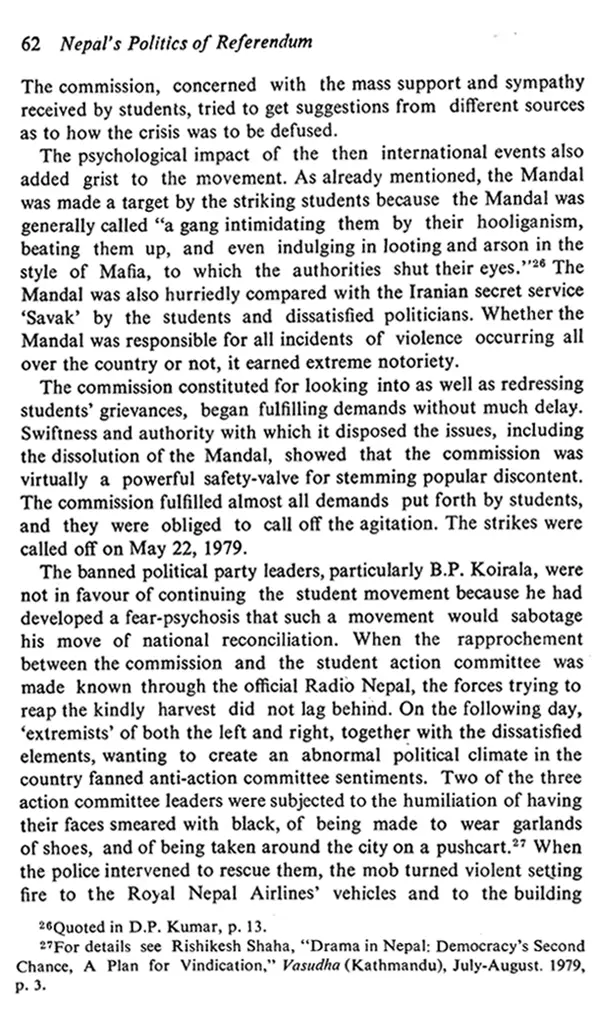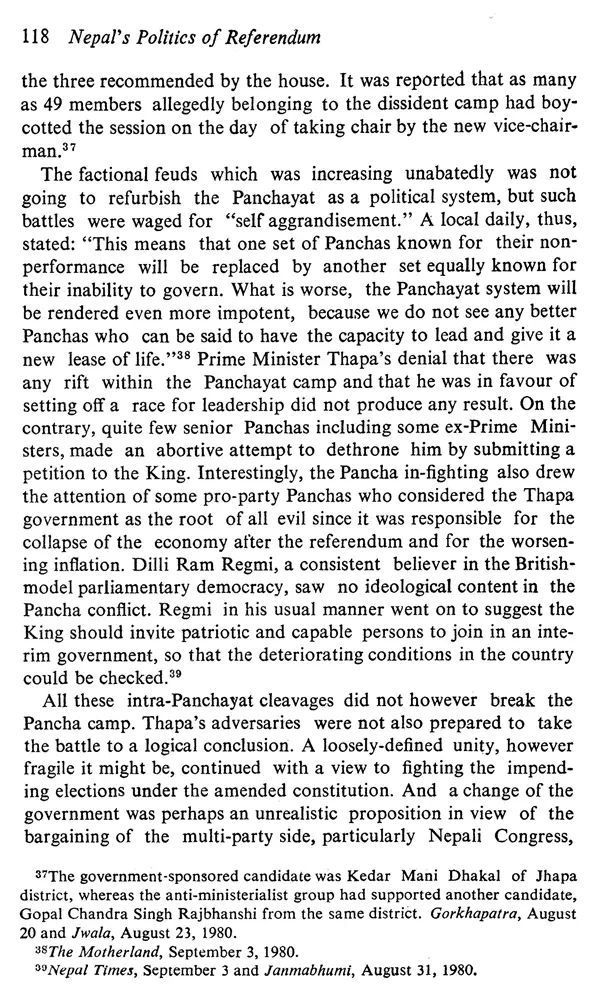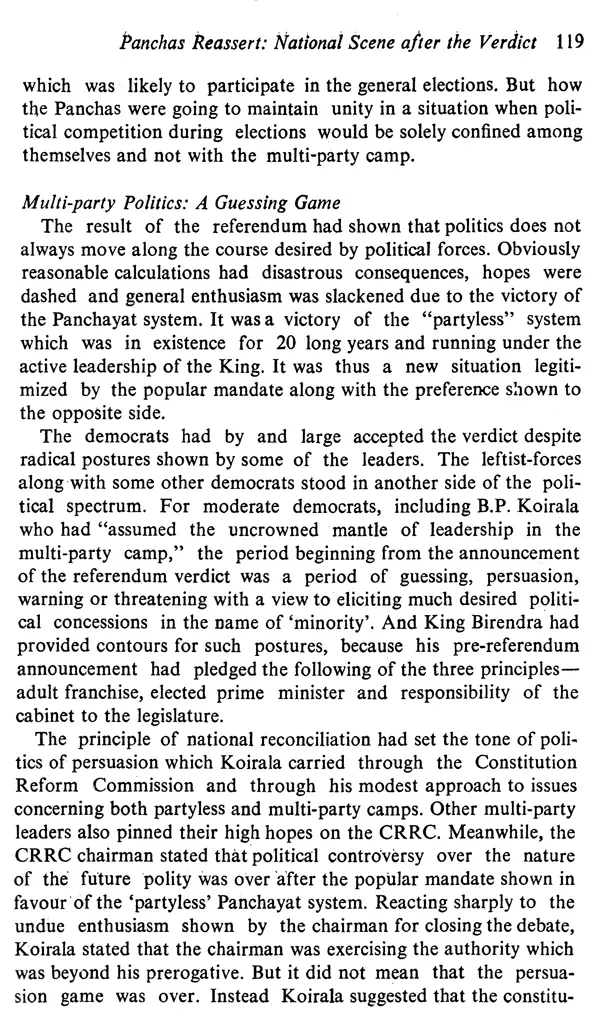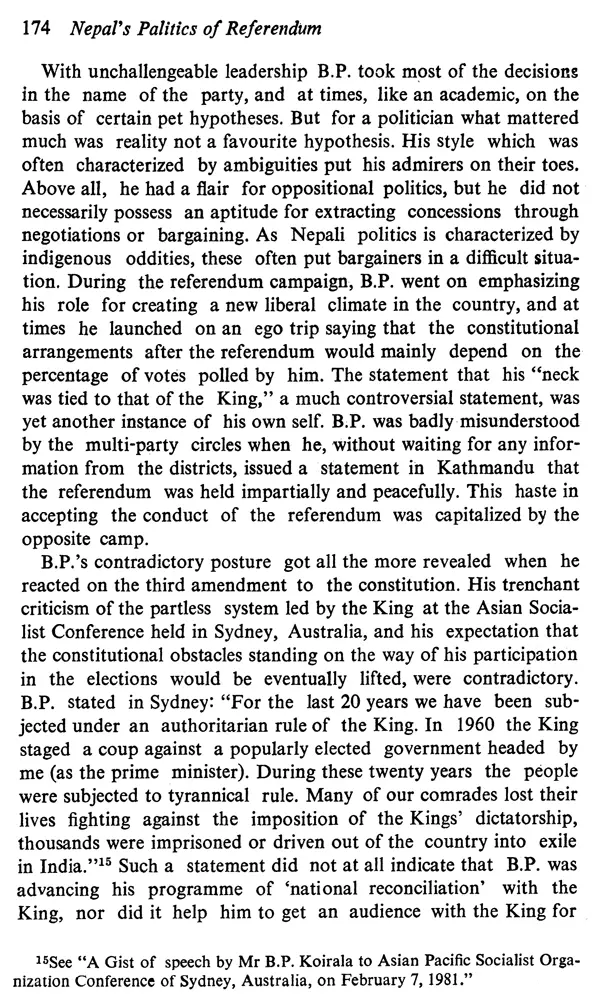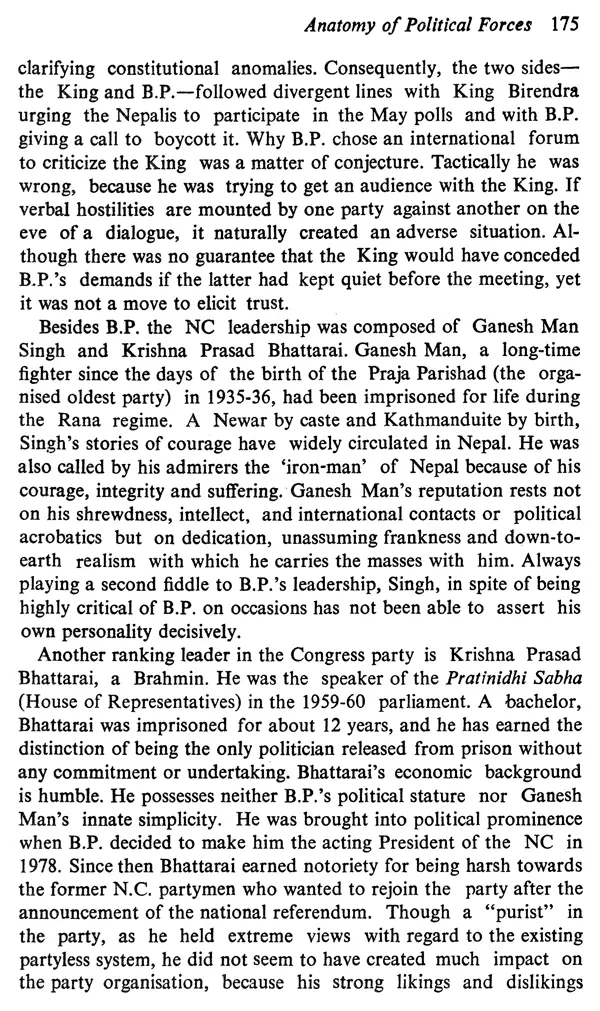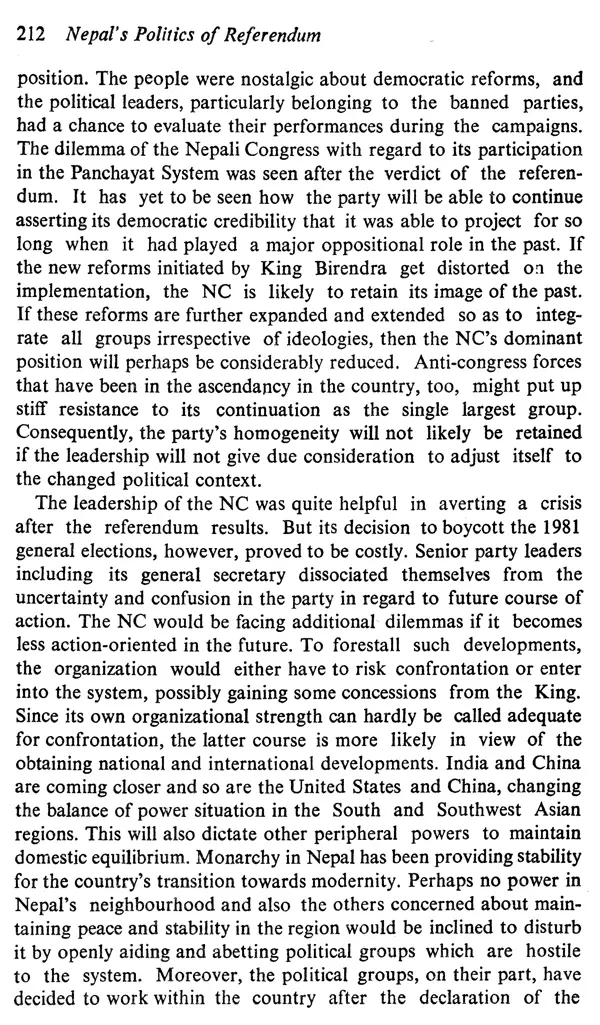
Nepal's Politics of Referendum- A Study of Groups, Personalities & Trends
Book Specification
| Item Code: | UAU275 |
| Author: | Lok Raj Baral |
| Publisher: | Mandala Book Point, Nepal |
| Language: | English |
| Edition: | 2021 |
| ISBN: | 9789993342533 |
| Pages: | 255 |
| Cover: | PAPERBACK |
| Other Details | 8.50 X 5.50 inch |
| Weight | 230 gm |
Book Description
The book presents a coherent picture of all the relevant issues, trends and personalities dominating the political scenario of Nepal, especially since the mid-1970s. The contributory factors for the national referendum. the interaction between the forces inimical to and supportive of the partyless Panchayat System, the politics of constitution making and the third amendment to the constitution have also been systematically dealt with. While discussing the nation-wide referendum result going for the current Panchayat System, which is viewed by many as a reassertion of status quo, Professor Baral holds the view that the forces absorbed by it and the first panchayat general election were the greatest democratic exercises since the first parliamentary election of 1959. Again, the author establishes the fact that though monarchy and democratic development are contradictory, in the post-1979 political context of Nepal they appear to be complementary to one another.
Based on basic source materials published during and after the referendum, and a number of interviews conducted by the author, the book will appeal to the students of politics, history and general readers alike.
Lok Raj Baral (Ph.D.) is Professor of Political Science and former ambassador of Nepal to India. Professor Baral was visiting professor at the University of Illinois at Urbana-Champaign, USA and visiting fellow at Chr. Michelson Institute at Bergin, Norway, Baral has twenty five books, both authored and edited, and has published articles in leading International Journals including, Asian Survey, Pacific Affairs, Pacific Community (Tokyo). Journal of Democracy, South Asian Survey International Studies (JNU), Ethnic Studies (Sri Lanka) and others. He has lectured at MIT, Oxford, University of Heidelberg, UCLA, City University of New York. Institute of International Studies (Beijing), National University of Singapore, University of Dhaka. University of Karachi, University of the Punjab (Lahore), University of North Bengal, University of Sikkim (Gangtok). Banaras Hindu University, just to mention a few. Baral was also Head of Political Science Department. Tribhuvan University.
The present study is primarily concerned with political develop ments in Nepal from the mid-1970s onward. At present Nepal is experiencing profound stresses in its efforts to finding out a direc tion towards institution building through legitimate popular means. This process, if allowed to develop, would also help bring about an attitudinal change, despite the deep-rooted legacies of the past. The first ever held national referendum in the country could be called a strategy or a sudden phenomenon in the Nepali political scene, but the trends it generated, and the ferment it displayed are of far-rea consequences for the country. Politically and economically, Nepal has reached such a stage after the referendum that no ad hoc decisions or arrangements can resolve the crises confronting the country.
The present study starts with the politics of the referendum, and ends with certain assumptions for the future. In trying to present a coherent picture of issues, trends and dynamics of political forces, it is attempted to be as much fair as possible in regard to all the involved parties. For the study basic source materials published during and after the referendum have been utilized, a number of open-ended interviews were conducted by the author for substan tiating the arguments developed in the study.
The book begins with a brief introduction of major trends seen in today's Nepali political scene. The second chapter deals with the main factors responsible for the decision behind the national refe rendum by King Birendra in May 1979. The third chapter gives the chequered political background, especially the interactions between forces inimical to the partyless Panchayat System and the forces supportive of the system. The next chapter deals with the changed political climate after the May 1979 Royal decision which put the 18-year old system on public trial. The fifth chapter discusses the people's psyche after the referendum verdict which went in favour of the partyless Panchayat System. The chapter also deals with the politics of constitution making. The sixth chapter deals with the third amendment to the constitution of Nepal, and the controver sies over the new reforms. The seventh chapter is an evaluation of political groups, personalities, issues, and trends.
Rulers usually have quite a few strategies for meeting emergency situations. In well established constitutional democracies, such emergency provisions are provided for in the constitution itself, and these are evoked when the seat of power is convinced, however subjectively it may be, that a determined use of coercion has become necessary to avert the crisis. If the constitutional mechanism fails to tackle the crisis arising either from internal disturbances or from external threats, or from certain other "contextual environments", rulers are known to resort to extreme emergency steps for removing such threats. The regime is armed with draconian rules of emergency ordinances which can be prolonged to an indefinite period, and which, then, tends to turn into a permanent dictator ship. When democracies give way to dictatorships, ruling demagogues start flouting every norm of democratic practices. Ordinarily democratic regimes are expected to be tolerant and patient in resolving crisis, but when the seat of power feels its position insecure, emergency provisions become their favourite mandate-making medium. However, strategies for forestalling crises tend to vary from country to country, depending upon the nature, background and dynamics of politics in the different settings. In Nepal, a Hinduised monarchical state, new and unpredictable circumstances often arise from the abrasive processes that modernization seems to generate. New ideas stir a society to the deeps even when the old values are not dismantled. Frustrations, con fusion and resentment among people can lead to chaotic conditions if the processes of change do not elicit appropriate responses from established institutions within the system. A country's cultural setting, its historical antecedents and political culture of its people play significant roles in determining the nature of the crises in the country and way these are resolved.
Nepal's history and its Hindu traditions have made the role of the King in the Nepali polity an assertive one. Political challenges posed either by internal dynamics of change or by external conditions do not provide rulers with unlimited options for exercising their power.
Book's Contents and Sample Pages
